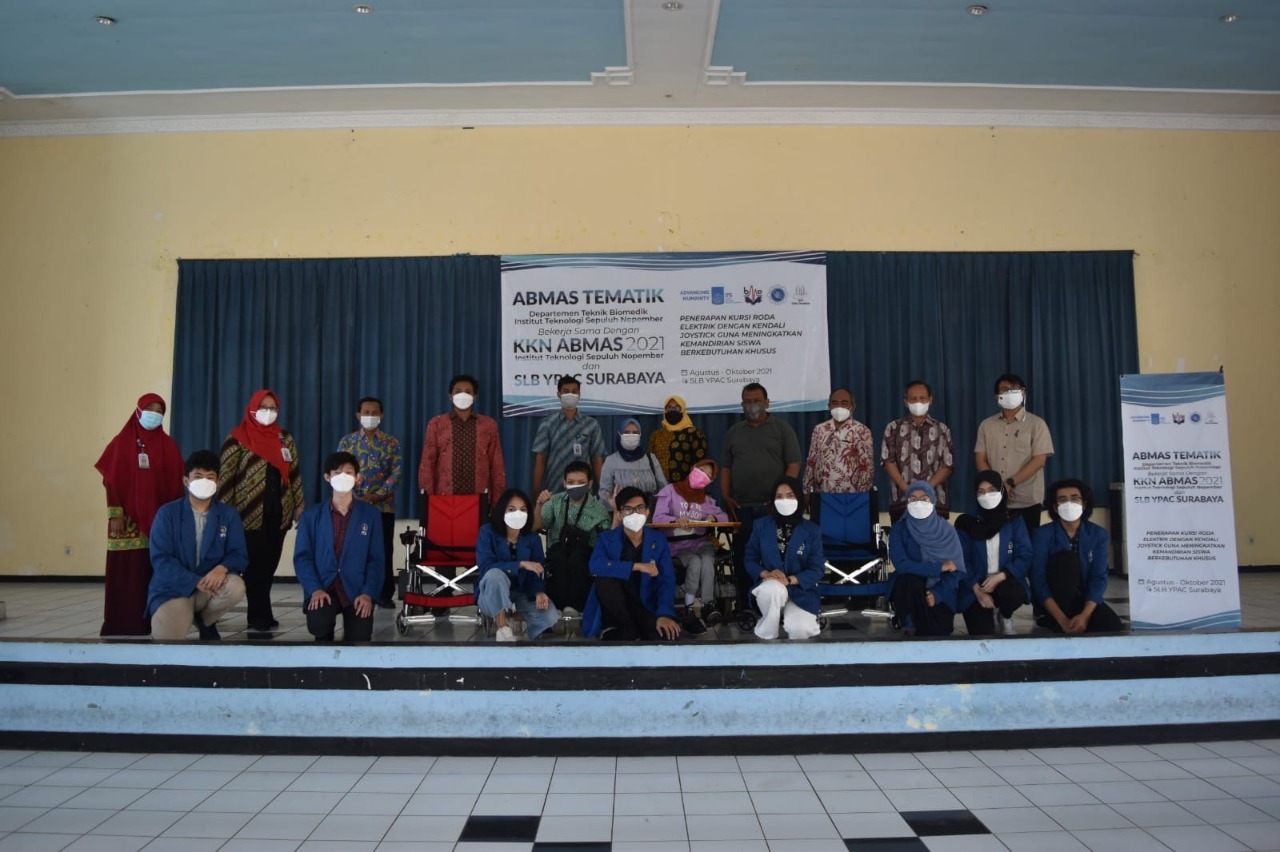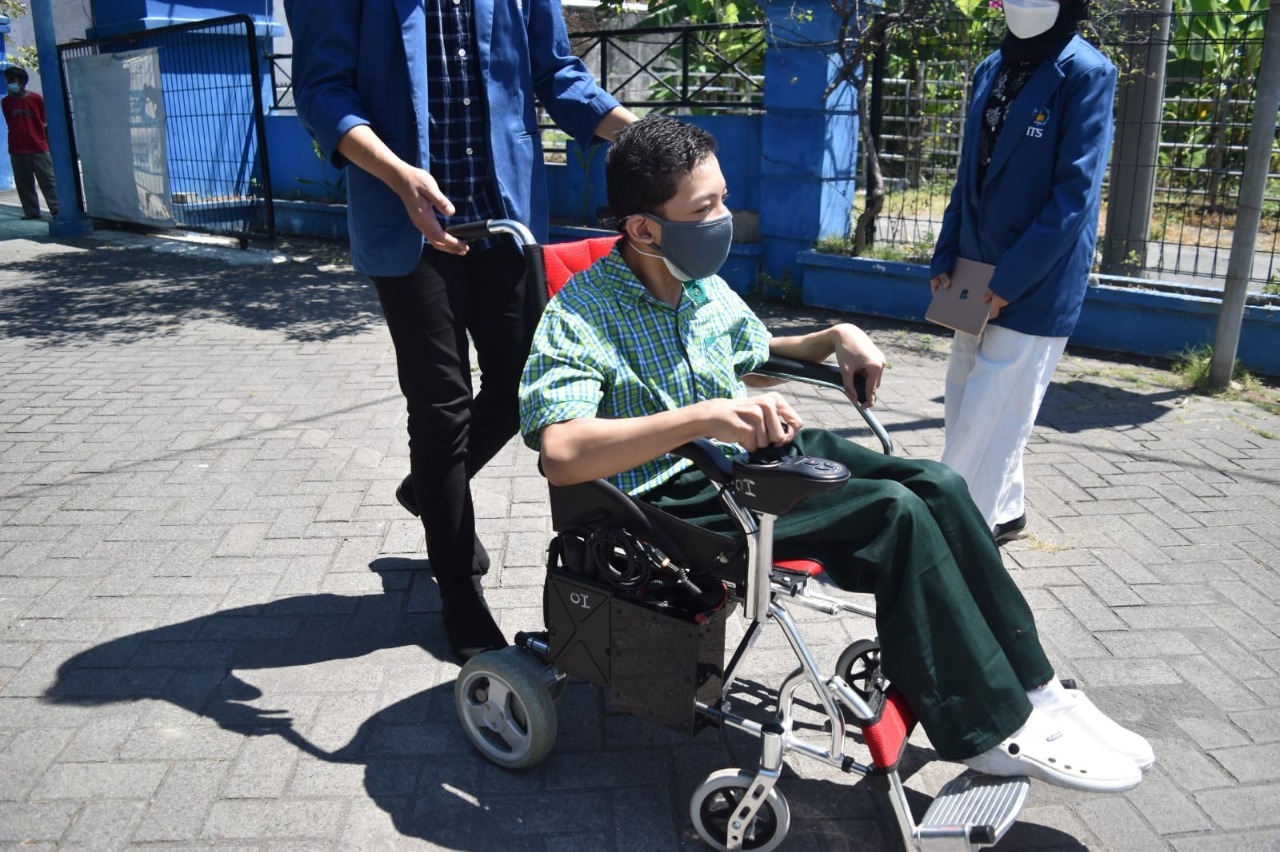ITS Student Study Service Team Develops Joystick Controlled Electric Wheelchair

ITS Student Study Service (KKN Abmas) team with the teachers and students of SLB YPAC Surabaya after the training and socialization of the electric wheelchair
ITS Campus, ITS News – Currently, the use of manual wheelchairs is still considered ineffective for people with disabilities. Departing from this problem, a team of lecturers and students from the Department of Biomedical Engineering, Institut Teknologi Sepuluh Nopember (ITS) developed a Joystick controlled Electric Wheelchair with a portable table .
Eko Agus Suprayitno SSi MT, a member of the lecturers involved in this team, revealed that the wheelchair made is basically a manual wheelchair that has been modified by adding a motor device to upgrade it into an electric wheelchair. Interestingly, this chair can be moved forward, backward, or turn sideways using a joystick. “To be more practical, we use batteries as a source of electrical power so that they can charge it again,” said Eko.
In addition, he continued, this electric wheelchair is also equipped with a portable table that functions to maximize user needs in mobility. ” We are working on this portable table feature, and it is still in the completion stage,” said Eko.
From a safety perspective, Eko said, this wheelchair is also equipped with a seat belt, so it can reduce the user from falling forward. In contrast to most powered wheelchairs in general, this tool can be folded, making it easier to carry around. “Most importantly, our tool is also equipped with a manual book to guide users in its operation and maintenance,” he explained.
This research, according to Eko, was motivated by the majority of YPAC SLB students who, in their activities, still use conventional wheelchairs. Moreover, each student requires special teacher assistance to move around. “In fact, the number of teacher resources there (SLB YPAC, ed) is less than the number of students,” said Eko.
On the other hand, added Eko, research on electric wheelchairs is one example of assistive technology developed in the Department of Biomedical Engineering. “With this problem, the dissemination of research results becomes more useful for people in need,” said the lecturer born in Pasuruan, August 13, 1987.

One of the SLB YPAC Surabaya students trying the Electric Wheelchair assisted by the ITS KKN Abmas team
Besides the close distance to the ITS campus, the choice to make SLB YPAC Surabaya the research destination was because most of the lecturers and students involved were around Surabaya. “This makes team mobilization easier, especially during the pandemic that requires us to reduce the risk of the spread of Covid-19,” he said.
Consisting of six lecturers and 10 students of the Biomedical Engineering Department, the Community Service (KKN) team members have been carrying out research activities since June and will end last September. Previously, this electric wheelchair, completed in 2020, was used for training and outreach to teachers and students of SLB YPAC Surabaya last August.
“After the socialization last month, we saw that the enthusiasm of students and teachers there was very high in welcoming this electric wheelchair,” said the man who graduated with a master’s degree in the Department of Electrical Engineering ITS.
The team carried out several program activities such as surveys and outreach offline by implementing a fairly strict health protocol given the Implementation of Community Activity Restrictions (PPKM). In the future, Eko hopes that the cooperative relationship between the Department of Biomedical Engineering and SLB YPAC Surabaya can continue to develop and be well established, especially in the field of assistive technology.
“We also hope that the community can implement the results of our research products in helping students with special needs at SLB YPAC Surabaya so that the dissemination of science and technology research products can provide benefits to community groups or partners in need,” he concluded. (nadh/ITS Public Relations)
Reporter: Erchi Ad’ha Loyensya
Related News
-
Supporting the Development of Material Processes, ITS Professors Utilize Biomass Waste
ITS Campus, ITS News — Innovation in material processes continues to develop to support society’s need for environmentally friendly
September 14, 2021 19:09 -
ITS Professor Ideas for Bio-Corrosion Control in Marine Structures
ITS Campus, ITS News — Coastal and offshore buildings interacting directly with seawater trigger damage, including bio-corrosion. If not
September 14, 2021 19:09 -
ITS Launches the First Marine Floating Solar Power Plant Prototype in Indonesia
ITS Campus, ITS News — Institut Teknologi Sepuluh Nopember (ITS)‘s commitment in realizing the energy transition is getting serious.
September 14, 2021 19:09 -
Targeting Champion, Bayucaraka ITS Launches Flying Robot Innovation
ITS Campus, ITS News – The Bayucaraka team at Institut Teknologi Sepuluh Nopember (ITS) has launched four new flying
September 14, 2021 19:09
